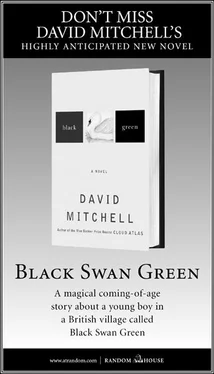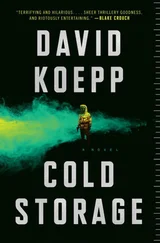David Mitchell - Cloud Atlas
Здесь есть возможность читать онлайн «David Mitchell - Cloud Atlas» весь текст электронной книги совершенно бесплатно (целиком полную версию без сокращений). В некоторых случаях можно слушать аудио, скачать через торрент в формате fb2 и присутствует краткое содержание. Жанр: Старинная литература, на английском языке. Описание произведения, (предисловие) а так же отзывы посетителей доступны на портале библиотеки ЛибКат.
- Название:Cloud Atlas
- Автор:
- Жанр:
- Год:неизвестен
- ISBN:нет данных
- Рейтинг книги:5 / 5. Голосов: 1
-
Избранное:Добавить в избранное
- Отзывы:
-
Ваша оценка:
- 100
- 1
- 2
- 3
- 4
- 5
Cloud Atlas: краткое содержание, описание и аннотация
Предлагаем к чтению аннотацию, описание, краткое содержание или предисловие (зависит от того, что написал сам автор книги «Cloud Atlas»). Если вы не нашли необходимую информацию о книге — напишите в комментариях, мы постараемся отыскать её.
Cloud Atlas — читать онлайн бесплатно полную книгу (весь текст) целиком
Ниже представлен текст книги, разбитый по страницам. Система сохранения места последней прочитанной страницы, позволяет с удобством читать онлайн бесплатно книгу «Cloud Atlas», без необходимости каждый раз заново искать на чём Вы остановились. Поставьте закладку, и сможете в любой момент перейти на страницу, на которой закончили чтение.
Интервал:
Закладка:
Such a terrible finality! Prone I lay, shocked & rigid, forgetting to breathe. Shouts far & near rose, feet gathered & an alarum of “Raise Doctor Goose!” cried forth.
“Sorry b—fall from rigging, dead now.” The Indian whispered as I made haste to investigate the disturbance. “You can nothing, Missa Ewing.” I ordered him to stay hidden & hurried out. I fancy the stowaway sensed how tempted I was to use the accident to betray him.
The crew stood around a man lying prone at the base of the midmast. By the lurching lantern light I recognized one of the Castilians. (I own that my first emotion was relief, that not Rafael but another had fallen to his death.) I overheard the Icelander say the dead man had won his compatriots’ arrack ration at cards & drunk it all before his watch. Henry arrived in his nightshirt with his doctor’s bag. He knelt by the mangled form & felt for a pulse, but shook his head. “This fellow has no need of a doctor.” Mr. Roderick retrieved the Castilian’s boots & clothes for auction & Mankin fetched some third-rate sackcloth for the cadaver. (Mr. Boerhaave will deduct the sackcloth from the auction’s profits.) The Jacks returned to their fo’c’sle or their stations in silence, every man made somber by this reminder of the fragility of life. Henry, Mr. Roderick & I stayed to watch the Castilians perform their Catholick death rites over their countryman before knotting up the sack & committing his body to the deep with tears & dolorous adíos! “Passionate Latinos,” observed Henry, bidding me a second good night. I yearned to share the secret of the Indian with my friend, but held my tongue lest my complicity infect him.
Returning from the melancholy scene, I saw a lantern gleam in the galley. Finbar sleeps there “to ward off pilferers,” but he too was roused by the night’s excitement. I recalled that the stowaway may not have eaten for a day & a half, fearfully, for what bestial depravity might a savage not be driven to by an empty stomach? My act might have stood against me on the morrow, but I told the cook a mighty hunger was robbing me of sleep & (at double the usual expense “on account o’ the unseason’ble hour”) I procured a platter of sauerkraut, sausage & buns hard as cannonballs.
Back in the confines of my cabin, the savage thanked me for the kindness & ate that humble fare as if it were a Presidential Banquet. I did not confess my true motives, viz., the fuller his stomach, the less likely he was to consume me, but instead asked him why, during his flogging, he had smiled at me. “Pain is strong, aye—but friends’ eyes, more strong.” I told him that he knows next to nothing about me & I know nothing about him. He jabbed at his eyes & jabbed at mine, as if that single gesture were ample explanation.
The wind rose higher as the middle watch wore on, making the timbers moan & whipping up the seas & sluicing over the decks. Seawater was soon dripping into my coffin, trickling down the walls & blotting my blanket. “You might have chosen a drier hidey-hole than mine,” I whispered, to test the stowaway’s wakefulness. “Safe better’n dry, Missa Ewing,” he murmured, alert as I. Why, I asked, was he beaten so savagely in the Indian hamlet? A silence stretched itself out. “I seen too much o’ the world, I ain’t good slave.” To ward off seasickness during those dreary hours, I teazed out the stowaway’s history. (I cannot, moreover, deny my curiosity.) His pidgin delivered his tale brokenly, so its substance only shall I endeavor to set down here.
White men’s ships bore vicissitudes to Old Rēkohu, as Mr. D’Arnoq narrated, but also marvels. During my stowaway’s boyhood, Autua yearned to learn more of these pale peoples from places whose existence, in his grandfather’s time, was the realm of myths. Autua claims his father had been amongst the natives Lt. Broughton’s landing party encountered in Skirmish Bay & spent his infancy hearing the yarn told & retold:—of the “Great Albatross,” paddling through the morning mists; its vividly plumaged, strangely jointed servants who canoed ashore, facing backwards; of the Albatross servants’ gibberish (a bird language?); of their smoke breathing; of their heinous violation of that tapu forbidding strangers to touch canoes (doing so curses the vessel & renders it as unseaworthy as if an ax had been taken to it); of the pursuant altercation; of those “shouting staffs” whose magical wrath could kill a man across the beach; & of the bright skirt of ocean-blue, cloud-white & blood-red that the servants hoisted aloft a pole before rowing back to the Great Albatross. (This flag was removed & presented to a chieftain, who wore it proudly until the scrofula took him.)
Autua had an uncle, Koche, who shipped aboard a Boston sealer, circa 1825. (The stowaway is unsure of his exact age.) Moriori were prized crew amongst such vessels, for in lieu of martial prowess, Rēkohu’s manhood “won their spurs” by seal hunting & swimming feats. (To claim his bride, as a further example, a young man had to dive to the seabed & surface with a crayfish in each hand & a third in his mouth.) Newly discovered Polynesians, it should be added, make easy prey for unscrupulous captains. Autua’s uncle Koche returned after five years, garbed in Pakeha clothes with rings in his ears, a modest pouch of dollars & réals , possessed of strange customs (“smoke breathing” amongst them), discordant oaths & tales of cities & sights too outlandish for the Moriori tongue to delineate.
Autua swore to ship on the next vessel leaving Ocean Bay & see these exotic places for himself. His uncle persuaded a second mate on a French whaler to ship the ten-year-old (?) Autua as an apprentice. In the Moriori’s subsequent career at sea, he saw the ice ranges of Antarctica, whales turned to islets of gore, then barrels of sperm oil; in the becalmed ashy Encantadas, he hunted giant tortoises; in Sydney, he saw grand buildings, parks, horse-drawn carriages & ladies in bonnets & the miracles of civilization; he shipped opium from Calcutta to Canton; survived dysentery in Batavia; lost half of an ear in a skirmish with Mexicans afore the altar at Santa Cruz; survived shipwreck at the Horn & saw Rio de Janeiro, though did not step ashore; & everywhere he observed that casual brutality lighter races show the darker.
Autua returned in the summer of 1835, a worldly-wise young man of about twenty. He planned to take a local bride & build a house & cultivate some acres, but as Mr. D’Arnoq relates, by the winter solstice of that year every Moriori who had not perished was a slave of the Maori. The returnee’s years amongst crews of all nations did not elevate Autua in the invaders’ estimation. (I observed how ill-timed was the prodigal’s homecoming. “No, Missa Ewing, Rēkohu called me home, so I see her death so I know” —he tapped his head—”the truth.”)
Autua’s master was the lizard-tattooed Maori, Kupaka, who told his horrified, broken slaves that he had come to cleanse them of their false idols (“Have your gods saved you?” taunted Kupaka); their polluted language (“My whip will teach you pure Maori!”); their tainted blood (“Inbreeding has diluted your original mana !” ) . Henceforth Moriori unions were proscribed & all issue fathered by Maori men on Moriori women were declared Maori. The earliest transgressors were executed in gruesome ways & the survivors lived in that state of lethargy engendered by relentless subjugation. Autua cleared land, planted wheat & tended hogs for Kupaka until he won enough trust to effect his escape. (“Secret places on Rēkohu, Missa Ewing, combes, pitfalls, caves deep in Motoporoporo Forest, so dense no dogs scent you there.” I fancy I fell into one such secret place.)
Читать дальшеИнтервал:
Закладка:
Похожие книги на «Cloud Atlas»
Представляем Вашему вниманию похожие книги на «Cloud Atlas» списком для выбора. Мы отобрали схожую по названию и смыслу литературу в надежде предоставить читателям больше вариантов отыскать новые, интересные, ещё непрочитанные произведения.
Обсуждение, отзывы о книге «Cloud Atlas» и просто собственные мнения читателей. Оставьте ваши комментарии, напишите, что Вы думаете о произведении, его смысле или главных героях. Укажите что конкретно понравилось, а что нет, и почему Вы так считаете.












